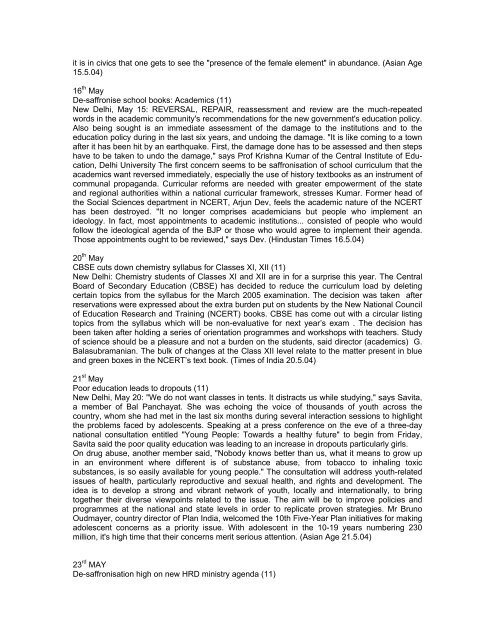EDUCATION - 2004 - Indian Social Institute
EDUCATION - 2004 - Indian Social Institute
EDUCATION - 2004 - Indian Social Institute
Create successful ePaper yourself
Turn your PDF publications into a flip-book with our unique Google optimized e-Paper software.
it is in civics that one gets to see the "presence of the female element" in abundance. (Asian Age<br />
15.5.04)<br />
16 th May<br />
De-saffronise school books: Academics (11)<br />
New Delhi, May 15: REVERSAL, REPAIR, reassessment and review are the much-repeated<br />
words in the academic community's recommendations for the new government's education policy.<br />
Also being sought is an immediate assessment of the damage to the institutions and to the<br />
education policy during in the last six years, and undoing the damage. "It is like coming to a town<br />
after it has been hit by an earthquake. First, the damage done has to be assessed and then steps<br />
have to be taken to undo the damage," says Prof Krishna Kumar of the Central <strong>Institute</strong> of Education,<br />
Delhi University The first concern seems to be saffronisation of school curriculum that the<br />
academics want reversed immediately, especially the use of history textbooks as an instrument of<br />
communal propaganda. Curricular reforms are needed with greater empowerment of the state<br />
and regional authorities within a national curricular framework, stresses Kumar. Former head of<br />
the <strong>Social</strong> Sciences department in NCERT, Arjun Dev, feels the academic nature of the NCERT<br />
has been destroyed. "It no longer comprises academicians but people who implement an<br />
ideology. In fact, most appointments to academic institutions... consisted of people who would<br />
follow the ideological agenda of the BJP or those who would agree to implement their agenda.<br />
Those appointments ought to be reviewed," says Dev. (Hindustan Times 16.5.04)<br />
20 th May<br />
CBSE cuts down chemistry syllabus for Classes XI, XII (11)<br />
New Delhi: Chemistry students of Classes XI and XII are in for a surprise this year. The Central<br />
Board of Secondary Education (CBSE) has decided to reduce the curriculum load by deleting<br />
certain topics from the syllabus for the March 2005 examination. The decision was taken after<br />
reservations were expressed about the extra burden put on students by the New National Council<br />
of Education Research and Training (NCERT) books. CBSE has come out with a circular listing<br />
topics from the syllabus which will be non-evaluative for next year’s exam . The decision has<br />
been taken after holding a series of orientation programmes and workshops with teachers. Study<br />
of science should be a pleasure and not a burden on the students, said director (academics) G.<br />
Balasubramanian. The bulk of changes at the Class XII level relate to the matter present in blue<br />
and green boxes in the NCERT’s text book. (Times of India 20.5.04)<br />
21 st May<br />
Poor education leads to dropouts (11)<br />
New Delhi, May 20: "We do not want classes in tents. It distracts us while studying," says Savita,<br />
a member of Bal Panchayat. She was echoing the voice of thousands of youth across the<br />
country, whom she had met in the last six months during several interaction sessions to highlight<br />
the problems faced by adolescents. Speaking at a press conference on the eve of a three-day<br />
national consultation entitled "Young People: Towards a healthy future" to begin from Friday,<br />
Savita said the poor quality education was leading to an increase in dropouts particularly girls.<br />
On drug abuse, another member said, "Nobody knows better than us, what it means to grow up<br />
in an environment where different is of substance abuse, from tobacco to inhaling toxic<br />
substances, is so easily available for young people." The consultation will address youth-related<br />
issues of health, particularly reproductive and sexual health, and rights and development. The<br />
idea is to develop a strong and vibrant network of youth, locally and internationally, to bring<br />
together their diverse viewpoints related to the issue. The aim will be to improve policies and<br />
programmes at the national and state levels in order to replicate proven strategies. Mr Bruno<br />
Oudmayer, country director of Plan India, welcomed the 10th Five-Year Plan initiatives for making<br />
adolescent concerns as a priority issue. With adolescent in the 10-19 years numbering 230<br />
million, it's high time that their concerns merit serious attention. (Asian Age 21.5.04)<br />
23 rd MAY<br />
De-saffronisation high on new HRD ministry agenda (11)

















